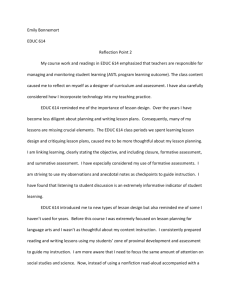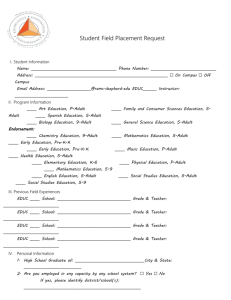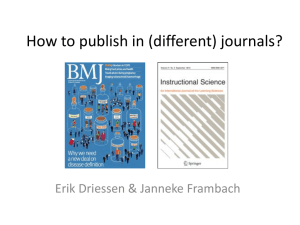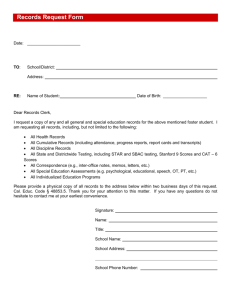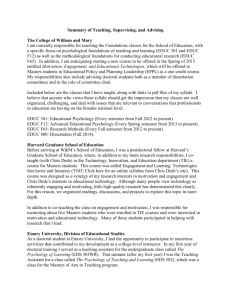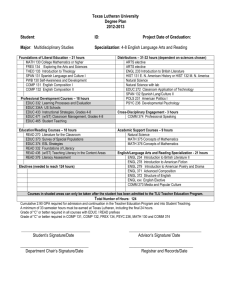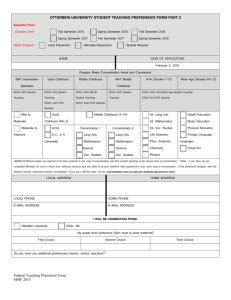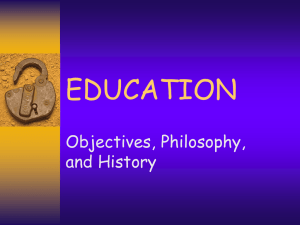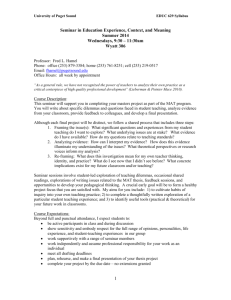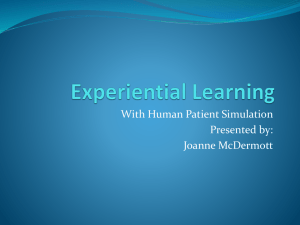Early Childhood Education
advertisement
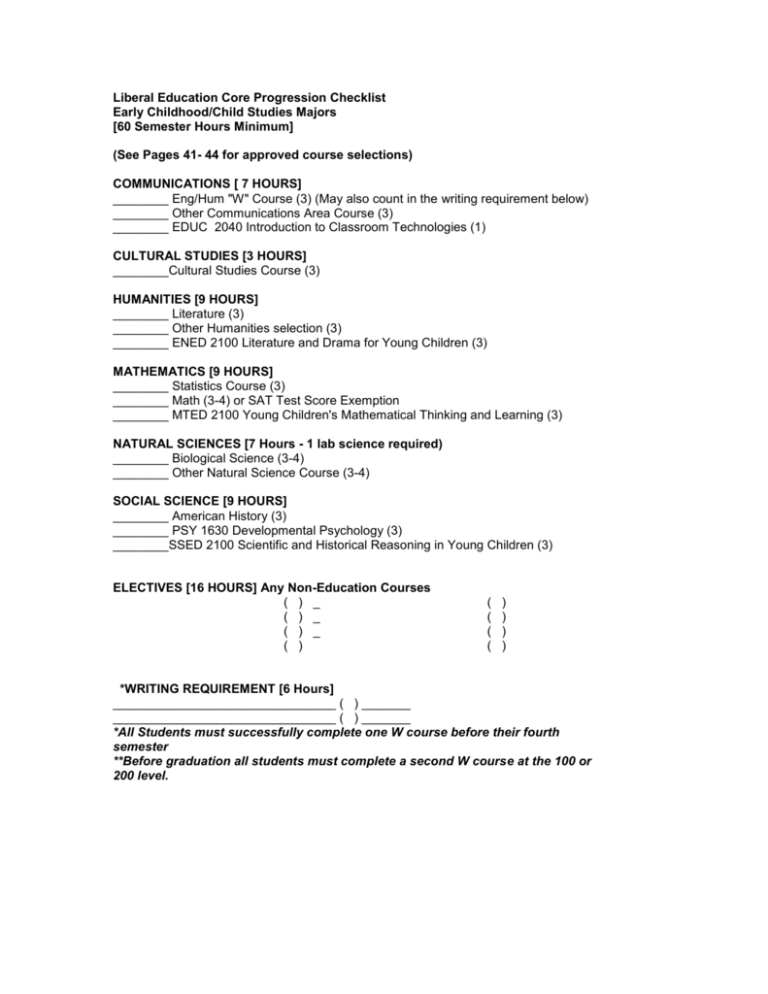
Liberal Education Core Progression Checklist Early Childhood/Child Studies Majors [60 Semester Hours Minimum] (See Pages 41- 44 for approved course selections) COMMUNICATIONS [ 7 HOURS] ________ Eng/Hum "W" Course (3) (May also count in the writing requirement below) ________ Other Communications Area Course (3) ________ EDUC 2040 Introduction to Classroom Technologies (1) CULTURAL STUDIES [3 HOURS] ________Cultural Studies Course (3) HUMANITIES [9 HOURS] ________ Literature (3) ________ Other Humanities selection (3) ________ ENED 2100 Literature and Drama for Young Children (3) MATHEMATICS [9 HOURS] ________ Statistics Course (3) ________ Math (3-4) or SAT Test Score Exemption ________ MTED 2100 Young Children's Mathematical Thinking and Learning (3) NATURAL SCIENCES [7 Hours - 1 lab science required) ________ Biological Science (3-4) ________ Other Natural Science Course (3-4) SOCIAL SCIENCE [9 HOURS] ________ American History (3) ________ PSY 1630 Developmental Psychology (3) ________SSED 2100 Scientific and Historical Reasoning in Young Children (3) ELECTIVES [16 HOURS] Any Non-Education Courses ( ) _ ( ) _ ( ) _ ( ) ( ( ( ( ) ) ) ) *WRITING REQUIREMENT [6 Hours] ________________________________ ( ) _______ ________________________________ ( ) _______ *All Students must successfully complete one W course before their fourth semester **Before graduation all students must complete a second W course at the 100 or 200 level. Early Childhood Education/Child Studies Major Checklists EARLY CHILDHOOD Pedagogical Courses [27 hours] ________ EDUC 2117 Methods of Language and Literacy in Early Childhood (3) ________ EDUC 2130 Curriculum Programming: Birth-Age 3 (3) ________ EDUC 2140 Curriculum Programming: Age 3-Kindergarten (3) ________ EDUC 2150 Science and Social Studies Instruction in Early Grades (3) ________ EDUC 2180 Managing Instructional Settings for Young Children (2) ________ HMED 2150 Arts Education for Young Children (2) ________ MTED 2150 Mathematics Instruction in Early Grades (2) ________ SPED 2010 Introduction to Instructional Model (3) ________ SPED 2420 Assessment Procedures for Young Children (3) ________ SPED 2870 Accommodating Academic Diversity in the Classroom (3) Field Experiences [14 hours] ________ EDUC 2116 Practicum Teaching Early Childhd Reading & Lang.Arts (1) ________ EDUC 2151 Practicum Mathematics, Science, & Social Studies (1) ________ EDUC 2291 Student Teaching Seminar: Early Childhood (3) ________ EDUC 2702 Student Teaching in Early Childhood (9) CHILD STUDIES [24 hours + 12 hours in the Liberal Core] ___X____ PSY 1630 Developmental Psychology (Liberal Core) (3) One Course from: ________ PSY 2510 ________ PSY 2520 ________ PSY 2530 ________ HOD 1700 Experimental Research Methods Observational Research Methods Psychometric Methods (3) Systematic Inquiry (3) (3) (3) Two Courses from: ________ PSY 1500 Cognitive Aspects of Human Development (3) ________ PSY 1750 Social and Personality Development (3) ________ PSY 2250 Infancy (3) Other Required Courses: ________ EDUC 1020 Society, the School, and the Teacher (3) ________ EDUC 2115 Language & Literacy Learning in Young Children (3) ________ EDUC 2120 Parents and Their Developing Children (3) ___X____ ENED 2100 Literature and Drama for Young Children (Liberal Core) (3) ___X____ MTED 2100 Young Child. Math. Thinking and Learning (Liberal Core) (3) ___X____ SSED 2100 Scientific & Historical Reasoning in YC (Liberal Core) (3) ________ SPED 1010 Introduction to Exceptionality (3) ________ SPED 2030 Introduction to Language and Communication (3) Course Descriptions EDUC 2040. Introduction to Classroom Technologies. An introduction to various technologies used in classrooms with emphasis on microcomputer-based systems. Meets licensure requirements for preservice teachers. [1] EDUC 2116. Practicum in Teaching Early Childhood Reading and Language Arts. Field experiences in a variety of early childhood centers or classroom settings designed to provide practical experience and reflection on the teaching of reading and the language arts. Corequisite: EDUC 2117. [1] EDUC 2117. Methods of Language and Literacy Instruction in Early Childhood. This course introduces methods for structuring classrooms to teach and assess reading, writing, speaking, and listening as part of an integrated language arts program for children from birth through grade 4, with special emphasis on children from birth to age 8. Corequisite: EDUC 2116 [3] EDUC 2130. Curriculum Programming: Birth–Age 3. Focus on programs for and the teaching of infants and toddlers. Students will learn how to support the physical, social, emotional, language, and cognitive development of infants and toddlers in out of home settings and to understand individual differences in development and to support those differences through appropriate planning. A 20-hour practicum enables students to interact with very young children in a group environment. [3] EDUC 2140. Curriculum Programming: Ages 3–Kindergarten. Students become familiar with a variety of program models for young children and engage in curriculum development and instructional planning for young children with a variety of developmental needs. Focus is on preschool education and transition to formal school schooling. A 20-hour practicum enables students to interact with very preschool children in a group environment. [3] EDUC 2150. Science and Social Studies Instruction in Early Grades This course is designed to prepare prospective early childhood teachers to provide instruction in science, and social studies. The course builds on the core content course in science and social studies in the early childhood program as well as the curriculum courses for ages 0-3 and age 3-kindergarten. Prerequisite: SSED 2100; corequisite: MTED 2150 and EDUC 2151. [3] EDUC 2151. Practicum in Mathematics, Science, and Social Studies Instruction in Early Grades. Field experiences in an early grades classroom are designed to provide practical experience and reflection on the teaching of mathematics, science, and social studies. Corequisite: EDUC 2150 and MTED 2150. [1] EDUC 2180. Managing Instructional Settings for Young Children. The purpose of this course is to introduce students to the social and emotional characteristics of young children that affect the ways they function in groups, and to acquaint students with planning and management philosophies and a variety of practices to use in guiding the behaviors of young children, from infancy through age 8. [2] EDUC 2291. Student Teaching Seminar: Early Childhood. Seminar to accompany EDUC 2702. [3] EDUC 2702. Student Teaching in Early Childhood. Observation and teaching experience for students seeking PreK–3 licensure. Undergraduate credit only. Prerequisite: admission to student teaching. [4-9] HMED 2150. Arts Education for Young Children. This course is designed to acquaint the early childhood teacher with concepts, techniques, and materials for creating opportunities for young children to learn about the visual arts and music. Strategies for incorporating art activities into group settings will be explored, as well as accommodating individual differences in young children's interest in and responsiveness to the arts. [2] MTED 2100. Young Children’s Mathematical Thinking and Learning. The focus of the course is on ways in which young children develop increasingly sophisticated additive structures, including pre-number and early number concepts, place value, strategies for single-and double-digit computation, and measurement. Children’s mathematical thinking and learning as well as ways to support that learning are investigated. This course is prerequisite to or corequisite with EDUC 2150. This course is not recommended for freshmen. [3] MTED 2150. Mathematics Instruction in the Early Grades. This course is designed to prepare prospective early childhood teachers to provide instruction in mathematics. The course builds on the core content course in mathematics in the early childhood program as well as the curriculum courses for ages 0-3 and age 3-kindergarten. Prerequisite: MTED 2100; corequisite: EDUC 2150 and EDUC 2151. [2] SPED 2010. Introduction to Instructional Models. An overview of instructional models that can be used with difficult-to-teach and disabled students. Emphasis is placed on instructional models that have empirical support for their effectiveness, facilitate continuous monitoring of student progress, and are amenable to the use of technology. Prerequisite: SPED 1010. [3] SPED 2420. Assessment Procedures for Young Children. Overview of measurement, theory, and practice in the assessment of early developmental problems. Course will address strategies for selecting appropriate and valid instruments and methods for the purpose of initial screening, evaluation to determine eligibility for services, and assessment to support program planning for infants, toddlers, and young children. Interpretation and synthesis of evaluation and assessment information for dissemination to families and other professionals is demonstrated. Students apply skills in early intervention, preschool, and/or early childhood education settings. Corequisite: SPED 2421. [3] SPED 2870. Accommodating Academic Diversity in the Classroom. Explores the importance and difficulty of teaching heterogeneously grouped students in mainstream classrooms and offers specific instructional strategies for doing so effectively. Focuses explicitly and exclusively on methods to help classroom teachers instruct and manage the behavior of a broad range of students—students with and without disabilities at multiple points along the achievement continuum. [3] ENED 2100. Literature and Drama for Young Children. Explores characteristics of good literature (with a particular focus on picture books and poetry) for children ages birth to ten, authors and illustrators of the genre, and issues in the area of literature for young children. Also explored is the study of drama as it impacts the development of young children. [3] SSED 2100. Scientific and Historical Reasoning in Young Children. This course focuses on issues of the development of subject matter reasoning and understanding in young children. The course will examine the interplay between informal and formal experiences that influence the development of scientific and historical reasoning as children transition from their intuitive theories to a more formal study of subject matter disciplines. [3] 718 VANDERBILTUNIVERSITY
